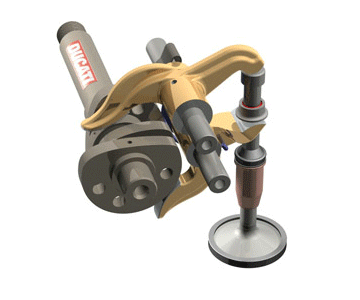Thats a lot of explanation for "we move the crank up and down" Now I wonder how the outdrives work?
You guys know that oil refineries have been using various styles of variable compression engines since before WW II, right? It's how they test a batch of fuel to determine the Motor Octane Number; keep upping the compression until the fuel knocks. My grandfather was a petroleum chemist/fuels specialist for Sun Oil from 1940 until he retired in 1983, and I remember him telling me about using their variable compression engine to develop the processes that allowed 115/130 octane avgas to be produced in massive quantity and extreme purity for the war effort.
Anyway, they have been around for a LONG time.
maschinenbau wrote: I bet it doesn't add much weight, probably equivalent to the weight of a few extra con rods. And if you factor in the weight savings from engine downsizing (this 2.0L I4 makes the same power and torque as a 3.5L V6) then the whole package is pretty appealing.
I bet it adds 40~50lbs. You have the con-rods. The positioning mechanism (which isn't going to be flimsy) essentially 1/2 of another crankshaft.
I think this is going to the wrong way and will flop with consumers. Mazdas SkyActive in the 6 with capacitor regen I think will work better.
maschinenbau wrote: The crank doesn't move on this one, the con rod length changes by hinging it.
I think you are getting into a semantic argument. It would depend if you see the hing mechanism as part of the crank, the rod, or another part entirely.
I would say it is another part entirely. It is a device that connects between the crank and the rod. Essentially it is a four-bar linkage.
In reply to WildScotsRacing:
There's a difference between those engines and ones that go into cars- namely size and weight. I never considered that idea to be transferable.
HappyAndy wrote: Wouldn't a Koneggsigg style fully camshaft-less electro-pnuematic valve train be able to accomplish the same thing (with 99% less Rube Goldberg) by selectively Atkinson cycling the intake valves? That looks like a mess
You can effectively reduce the compression by hanging valves as you're suggesting to exhaust back as the cylinder compresses slightly, but the expansion ratio is unchanged.
I agree the "extra" moving parts here make me question longevity/durability.
Oh, that's a much better illustration. The piston now rides on a variable cantilever which rides on the crank. Now with three times the rod bearings!
evildky wrote: Oh, that's a much better illustration. The piston now rides on a variable cantilever which rides on the crank. Now with three times the rod bearings!
All the additional bearings was what I thought of first. This desgn is going to need a hella stout oiling system.
evildky wrote: Oh, that's a much better illustration. The piston now rides on a variable cantilever which rides on the crank. Now with three times the rod bearings!
They should also update the valve train to keep the top and bottom end balanced.

This screams at me. It screams:
"I may bring some real fuel economy benefits to the equation but I will bring so much more complexity, parts count, size and weight that I will be worthless!"
In reply to tuna55:
It would be interesting to see it run. What we don't do well is make just a little power- so much is compromised to make a lot, that making a little is rough. So that optimum CR when you only need 4-20hp could be 14:1, whereas at WOT, it's closer to 10:1. This could help a lot.
It could also provide some additional ways to combat low quality/octane fuel. Instead of backing off timing to eliminate knock the ECU could adjust compression or adjust both.
In a flex fuel configuration you could take advantage of some of the benefits of e85 that are lost on a fixed CR engine. That could help offset the lost fuel economy normally seen when running e85.
You'll need to log in to post.